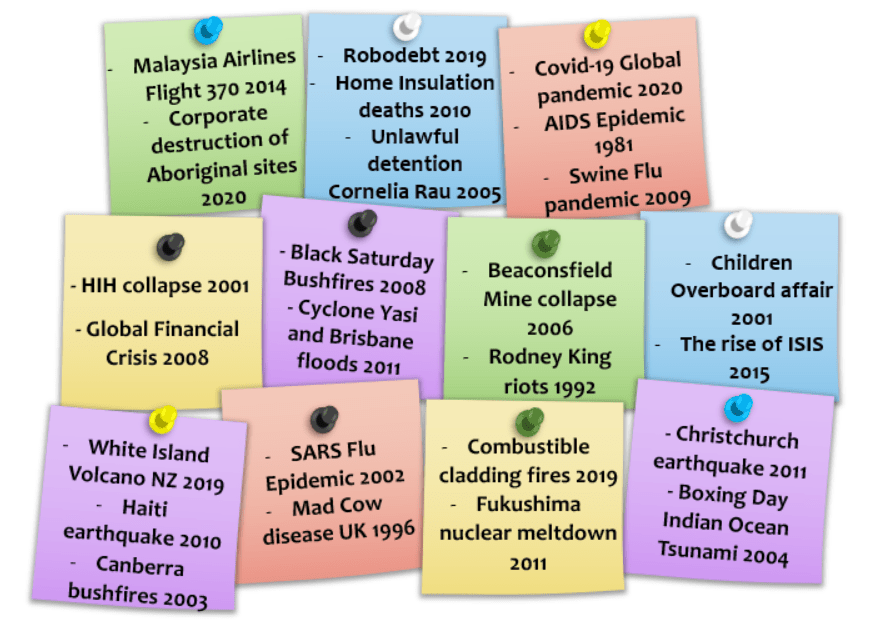Reflecting on the lessons from crisis management and rapid recovery

I wonder if we could take a minute out of our busy lives to reflect… What were you doing when some of these crises unfolded? What can you recall about the response to these events?

There are many different types of crises: natural and human-made disasters, political scandals, terrorism attacks, commercial collapses, global health emergencies. Some crises arrive swiftly, undetected, catching us off-guard. Others we can see coming from a long way off, yet are powerless to avoid them.
Now, take a moment to think about the past 12 months. Bushfires, floods, hailstorms, agri-pest plagues, global pandemic and financial collapse. And some communities experienced ALL of these in one year… Wow!
There are so many terms used (and overused) to describe what happened over the course of last year — ‘unprecedented’, ‘unexpected’, ‘new normal’ (not to mention ‘lock-down’, ‘quarantine’ and ‘vaccine’ also being terms on high rotation in conversation). But there are no words to adequately describe the real, cumulative impact and learnings from events across the past 12 months.
What changed in your world throughout the year, particularly with regards to work? Collectively, what did we learn in our teams and organisations? What elements of our work and ways of working were we able to quickly adapt? Were we flexible and responsive? Did we behave with agility?
I am betting there are any number of examples where you, your team and the organisation has flexed responsively to deal with a dramatically different environment. Each of us has many examples of things to be proud of across the past 12 months. Indeed, the lessons are now emerging about the silver linings that have come from our ability to flex and adapt.
So what?
Well, here’s what: it tells us that we can do it. It tells us we have the aptitude as individuals, teams and organisations to be flexible and responsive to changing needs in our environment. And that, in a nutshell is what should be at the centre of crisis and recovery lessons management.
Leaders focused on being future-ready are now picking at the threads of what they have observed across the past 12 months. This goes beyond how well policies, structures, procedures, plans and decision-making enabled an appropriate response to the recent crises. It instead delves deeper into questions about:
- leadership
- new ways of working
- governance
- culture
- resilience
- complexity management
- future of work.
And leverages lessons drawn from each of the six phases of crisis management and recovery
Prepare, prepare, prepare – the tip of the iceberg
Pandemic theory did not prepare us for the ferocious speed of the global crisis in 2020. In Australia and New Zealand, it still feels like crisis measures are being announced weekly to protect community health and the economy. This has led to an immense strain on government services and the public sector. And some say this is the tip of the iceberg…that children born in 2021 will experience more than 20 pandemics in their lifetime!
How prepared were you to adapt your leadership style, change management and communication approach? How prepared were your team for the magnitude of change required at pace? What served you well, and what would you do differently?
Response and activation – simplicity, flexibility and agility
Watching press conferences to find out what policies are being introduced isn’t the normal way the public sector operates. These days, you’re implementing changes fast! The usual way of doing things is shelved to allow for expedient delivery of government services.
What techniques did you use to guide your approach to rolling out rapid changes across the last 12-months? Were you able to flex the workforce appropriately? Did your command-and-control structure work? How would you adjust these elements going forward?
Business as un-usual – mobilisation for the medium term
The second most overused term of the current crisis is ‘the new normal’. But it does ring true. When a crisis occurs, we naturally leap into ‘firefighting’ mode. It’s not until later we see that our initial response has led to changes in what we do and how we do it.
Were the leaders genuinely united around common goals, and able to reframe strategy and priorities? What role did design thinking, or user-impact play in decisions around how to proceed? Was the leadership support targeted appropriately to ensure team focus, motivation and engagement during really difficult times?
Maintaining the pace of positive impact – response stability and improvement
Where’s that crystal ball to tell us when things will get back to normal? What’s that? It doesn’t exist. The reality is our pathway out of any crisis is unclear. In the meantime, the public sector must continue to deliver essential and non-essential services as the situations demands. As response efforts settle in, we are in a position to bring some stability and improvement to our operating rhythms, decision-making, and communications.
How were complex issues handled? Were decisions made with speed and intelligence, relying on quality evidence? How did you monitor resilience levels of yourself and those around you?
Lifting our eyes to the horizon – recovery planning and projections
Once new ways of working are operating smoothly, we naturally start to lift our eyes to the horizon and consider ‘What will the NEXT normal look like?’ Investing in deliberate planning for recovery of teams, work plans and organisations is crucial, and must be done in the context of what we have learned so far on this journey.
What new ways of communicating, interacting, and delivering work led to capability uplift and freed up capacity? What will you seek to retain and retire in these elements going forward? How has stakeholder sentiment about your team or organisation shifted, and what should be done about that?
Rapid recover and long-term response – lessons management
The shift from high tension, swift-paced crisis work back to pre-crisis business as usual will take adjustment. This period should be well thought through and intentionally planned. Impacts to citizen expectations, demand for government services, the economy and fiscal outlook, and the expectations of government on the public sector will all be important considerations.
What did you learn about the culture of your team and organisation? What capability building is required to ensure your team and organisation are future ready? Do you have a clear lessons management process to capture learnings and embed changes going forward?
Want to know more? Learn how to develop and assess the capability of your team in better practice crisis management and recovery. Ask us about our six-part Masterclass series where we examine how to manage through each phase of crisis management and drive rapid recovery within your workplace. The courseware covers rapid mobilisation of effort, accelerated decision-making, leadership styles, flexible implementation approaches, targeted change management, interim governance changes, team resilience, productivity, recovery planning, transition and lessons management.
As part of this interactive series, we will look at lessons from real life case studies, and use practice activities and tools to apply the learnings from each session. Complementary advice in applying the learnings from each session within your own workplace is provided as part of this Masterclass series.
Contact Charitee Davies







 We are all about sharing our expertise to help you and your organisation be the best it can be.
We are all about sharing our expertise to help you and your organisation be the best it can be.